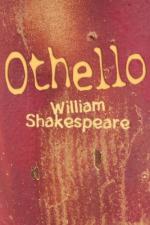|
This section contains 825 words (approx. 3 pages at 400 words per page) |

|
Irony
Harmon and Holman in A Handbook to Literature define irony as "a broad term referring to the recognition of a reality different from appearance." Othello is an essentially ironic play in that Shakespeare creates such a wide divide between what appears to be real to the characters in the play and what appears to be real to the audience in the theater. He does this through several devices. In the first place, Shakespeare offers Iago some of the best language in the playwright's whole body of work. Consequently, Iago appears to the other characters as well spoken, appealing, and attractive. His language makes him someone they trust. This is evident from the number of times a character (particularly Othello) refers to Iago as "honest." Iago does not look like the villain he is. In this, Shakespeare deviates from the traditions of the Middle Ages in which evil characters...
|
This section contains 825 words (approx. 3 pages at 400 words per page) |

|




